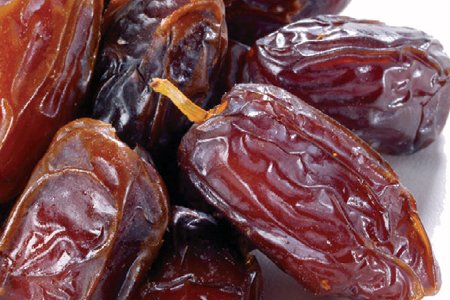
A Date for All Seasons
Issue 48 September 2008
This month as the sun dips in the evening sky, carefully planned iftar meals around the world, from Cairo to California and from Moscow to Sidney, will all include one thing in common: dates.
The desert fruit has been an enduring Ramadan tradition of Muslims for centuries. Dates have been mentioned in the Qur’an 20 times; in the story of Mary, dates provided sustenance during her pregnancy and labour. The narrations of the Prophet Muhammad tell us: “If anyone of you is fasting, let him break his fast with dates. In case he does not havethem, then with water. Verily water is a purifier.” Another prophetic saying relates that Aa’isha, may God be pleased with her, prescribed dates for anxiety, depression, fatigue and listlessness. Date is the name of the fruit of the date palm, one of the oldest cultivated crops in the history of civilisation, and has been a staple of the Middle Eastern diet for millennia. The tree bears fruit about seven years after planting, though once mature it can produce over 200 lb of dates every season.
Today, a wide variety of dates are available from a gourmet selection to pitted and chopped baking additions. They are stuffed with almonds, hazelnuts, cheeses, marzipan, lemon or orange slivers and are even chocolate coated. In the Middle East and Pakistan dates are added to yogurt or blended with milk for a refreshing drink.
Modern science has confirmed what was already known long ago and in the Islamic tradition: dates are healthy. Dates contain seven vitamins and 11 minerals and they are excellent sources of natural fibres. Eating only a few dates also supplies more than two grams of protein. Dates also contain fats and nutrients such as calcium, sulfur, iron, potassium, phosphorous, manganese, copper, and magnesium. This palm fruit is packed with so many nutrients in such sufficient amounts that a single date is considered to represent the very minimum of a balanced and healthy diet.
As we learn from the Qur’anic story, dates are beneficial for pregnant women. This nourishing fruit has properties that help to strengthen the muscles of the uterus, making dilation during delivery easier and reducing bleeding afterwards. The high carbohydrate content of dates makes them an invigorating food for breast-feeding mothers as well as alleviating postpartum depression.
Dates are easily digested and contain carbohydrates for fast energy. They are an ideal food for gastrointestinal disorders such as constipation because of their fibre and nicotinic content which make them a light laxative.
They also maintain the growth of beneficial bacteria in the intestines and help to get rid of disease causing pathogens. Some research indicates that dates are effective in preventing certain abdominal cancer.
High in calcium, dates aid in building and maintaining strong bones and teeth in children and adults. Islamic medicine prescribes milk boiled with dates to refresh the body and help recover after illness. Other recommendations include the consumption of soaked and crushed dates to improve vascular conditions.
Additionally dates may be effective in preventing or treating heart conditions, respiratory disorders, disorders of the eyes, sterility, anaemia and even allergies. Bedouin Arabs who subsist on dates regularly show a low incidence of heart disease and certain cancers.
So, all this proves that a date isn’t just for Ramadan, it’s for life!
Bookmark this |
|
Add to DIGG |
|
Add to del.icio.us |
|
Stumble this |
|
Share on Facebook |
|
Share this |
|
Send to a Friend |
|
Link to this |
|
Printer Friendly |
|
Print in plain text |
|

Comments
0 Comments